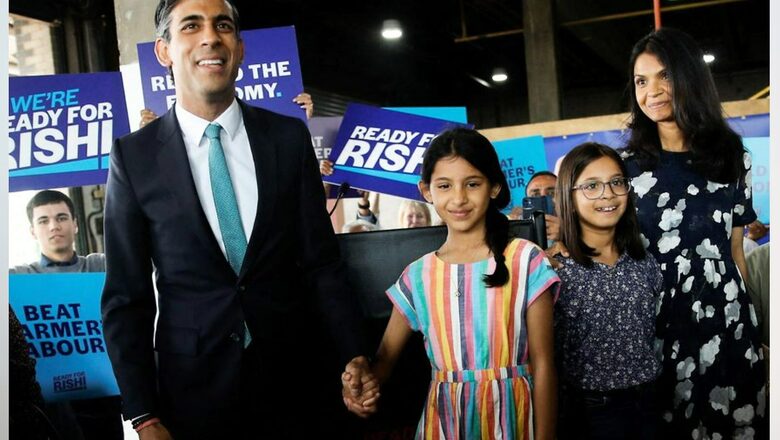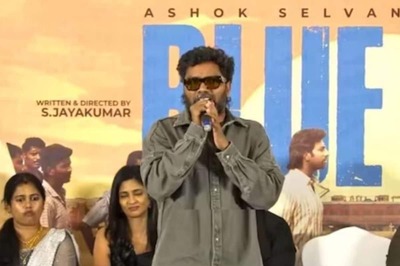
views
On 27 October 2022, Rishi Sunak, the United Kingdom’s new Prime Minister and the first Indian-origin person to hold the post, dialled Indian Prime Minister Narendra Modi. Speaking about this, Sunak tweeted, “The UK and India share so much. I’m excited about what our two great democracies can achieve as we deepen our security, defence and economic partnership in the months and years ahead.” Modi also took to Twitter about this call, where he emphasised strengthening the “Comprehensive Strategic Partnership” and the early conclusion of the Free Trade Agreement.
Sunak is not the only Indian-origin migrant who holds the top post in the host nation. Apart from him, another popular one is United States Vice President Kamala Harris. However, there are other less popular politicians as well who lead their respective countries. Like, Pravind Jugnauth, the Prime Minister of Mauritius; António Costa, the Prime Minister of Portugal; Leo Varadkar, the second-most powerful person in the Republic of Ireland. Other than that, several Indians lead multinational corporations whose revenues are more than the economies of many countries combined. Thus, the people from the Indian diaspora are directly managing the polity and economy of many nations.
More than 3.2 crore Indians are currently staying abroad as Non-Resident Indians (NRIs) and Overseas Citizens of India (OCIs), according to the Ministry of External Affairs’ data. With remittances received worth $87 billion in 2021, India tops the list of remittance recipients worldwide. Devesh Kapur, in his 2011 book Diaspora, Development, and Democracy: The Domestic Impact of International Migration From India, examines the domestic impact of this diaspora. Clearly, this rebukes the hyper-nationalist ad nauseam argument that they have left the country, so they can’t make any difference. The diaspora plays an important part, apart from the remittances, and should be
considered while discussing foreign policy issues.
The first and foremost conspicuous effort to reach out to the diaspora and connect them was undertaken by the Vajpayee government in 2003. With the Pravasi Bhartiya Divas, Pravasi Samman Awards, the Overseas Citizenship of India, and the Person of Indian Origin cards, Vajpayee provided the framework for future activities to outreach the Indian diaspora. The various diaspora communities need different approaches to deal with. Those in first-world countries like the US, UK, and Canada need dual citizenship and access to their wealth in India. While those in the Arab world need basic survival help, and those in the African and South-East Asian countries, who left their homeland at least a couple of generations back, want cultural engagement programmes. The Modi government worked significantly on the latter two, while not much progress had been made on the former.
Those who consider the diaspora as useless, criticise their achievement as not helpful for India, and oppose engagement with them are missing a larger point. If used properly, the Indian diaspora will be a substantial game-changing soft power for diplomacy and bilateral relations. Apart from remittances, the diaspora works as the unofficial ambassador of India, plays a crucial role in knowledge sharing and investment, and often lobbies for Indian causes. The most notable cause was the 123 Agreement, signed as a part of the 2008 India-US civil nuclear deal. The Indian diaspora played a critical role in making the agreement a reality.
In 2017, when Portuguese Prime Minister Antonio Costa came to India, he visited his ancestral home in Goa. The Modi government sensed the opportunity and seriously took the efforts to build the connections. Modi himself presented the OCI card to him on this visit. Since then, India and Portugal have increased their engagement with great enthusiasm. Last year, the Modi cabinet approved the signing of a pact between India and Portugal to properly recruit the Indian workforce in the European country. During the EU-India Leaders’ Summit at Porto, Lisbon was sitting on the chair and was supportive of the Indian stand for the Indo-Pacific line. The efforts seem to be successful.
There are some things India should work on. First, dual citizenship. At present, India’s approach is either my way or highway. It is time for a change. Let the individuals have dual citizenship, given that they don’t run for public office or manage some highly sensitive business. Second, consular issues need to be resolved. Lack of staff and technology should not come as an excuse. Third, the pathetic attitude of the customs officials. Those who have ever dealt with this department know how the red tape is rampant here.
However, there is a catch. The separatist and anti-India elements of Indian-origin can spoil the image of India, but with better PR and communications, things can be managed easily.
If India aspires to be a superpower in the 21st century, this can’t be possible without soft power. Time is ripe for an unprecedented engagement with the Indian diaspora and make it work for our values and interests.
Harshil Mehta is an analyst who writes on international relations, diplomacy, and national issues. The views expressed in this article are those of the author and do not represent the stand of this publication.
Read all the Latest Opinions here


















Comments
0 comment